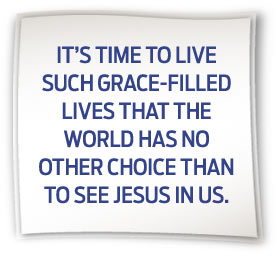
 hen justice and grace are placed together in the same sentence there seems to be a lack of an agreement between them. By definition we could argue that justice means to receive what is deserved. Grace is defined as receiving something better than what is deserved. We could say that justice and grace are not in total agreement; in fact, they are quite opposite. But perhaps the only way justice and grace could agree entirely is when Jesus is placed between them both.
hen justice and grace are placed together in the same sentence there seems to be a lack of an agreement between them. By definition we could argue that justice means to receive what is deserved. Grace is defined as receiving something better than what is deserved. We could say that justice and grace are not in total agreement; in fact, they are quite opposite. But perhaps the only way justice and grace could agree entirely is when Jesus is placed between them both.
 Did you know the amount of money people on this side of the world spend on ice cream each year is about $20 billion? A United Nations report stated that for half that amount, $11 billion, we could provide everyone on the planet with clean water, basic sanitation, and prevent the deaths of millions of babies each year.
Did you know the amount of money people on this side of the world spend on ice cream each year is about $20 billion? A United Nations report stated that for half that amount, $11 billion, we could provide everyone on the planet with clean water, basic sanitation, and prevent the deaths of millions of babies each year.
On this planet 33 percent of the population claims to be followers of Christ. These are people Jesus taught, “Just as you did it to one of the least of these who are members of my family, you did it me” (Matt. 25:40).* So, if for every two non-Christians there is one person claiming to be a follower of Christ, how is it that the world is in such a deep level of injustice?
The challenge we face as the community of Christ is to demonstrate that justice and grace belong together. But how can we accomplish such a tremendous task? Ellen White wrote: “Christ’s method alone will give true success in reaching the people. The Savior mingled with men [and women] as one who desired their good. He showed His sympathy for them, ministered to their needs, and won their confidence. Then He bade them, ‘Follow Me’” (The Ministry of Healing, p. 143). So let’s take a look at how the Savior worked, as we find it in Matthew 14.
Trying to Get Away
When the news of the violent death of His cousin, John the Baptist, reached Jesus, He decided it was time to go away from the crowds. So, along with His disciples, He crossed the Sea of Galilee to the town of Bethsaida. But His escape did not go unnoticed. When the boat arrived to the shore, a crowd of more than 5,000 people were waiting for Jesus and His crew.
Jesus could have sent the disciples to pray for the people, while He went up to the mountain to care for His own needs. However, instead of dispersing the crowd and sending them home, Jesus “had compassion for them” (verse 14).
Jesus came out of the boat with His disciples and welcomed the people, spoke about the kingdom of God, and “healed those who needed to be cured” (Luke 9:11). Jesus wanted to teach His disciples that when the justice of grace is present, the needy don’t have to go anywhere else.
 Coming out of the boat, Jesus walked to the people; He didn’t wait for them to come to Him. In fact, He prevented them from going away, even kept them there.
Coming out of the boat, Jesus walked to the people; He didn’t wait for them to come to Him. In fact, He prevented them from going away, even kept them there.
After hours of teaching and healing, the sun began to set. The disciples, hungry themselves, asked Jesus to “send the crowds away” (Matt. 14:15).
Jesus replied, “You give them something to eat” (verse 16).
This is what I call Jesus’ instructional sense of humor. First of all, the disciples did not have time to prepare for the trip; it was an emergency exit! Second, the original purpose of the trip was very different from what it had become. To everything that had happened to this point, Jesus responded with an improvisation. And third, let’s not forget they were in a “deserted place” (verse 13 and 15). From where could the overwhelmed disciples purchase food for the multitude? Philip realized the outrageous demand: “Six months’ wages would not buy enough bread for each of them to get a little” (John 6:7).
But Jesus wanted to show them, and us, that when the justice of grace is present, what we have is enough.
When a Little Is a Lot
As the disciples returned from their desperate search for food, Andrew, Peter’s brother, came with a boy and his lunch (John 6:8, 9). Much has been said about that. So I will only add: It’s not how much you have that’s important, but how much you want to serve.
 When the disciples said, “We have nothing here but five loaves and two fish” (Matt. 14:17), they could also have said, “We’re sorry, Jesus. We tried to get a truck full of fish sandwiches, but we could not find any. So the people have to go home hungry.”
When the disciples said, “We have nothing here but five loaves and two fish” (Matt. 14:17), they could also have said, “We’re sorry, Jesus. We tried to get a truck full of fish sandwiches, but we could not find any. So the people have to go home hungry.”
But Jesus responded, “Bring them here to me” (verse 18). Without Jesus, our human efforts, regardless of how big they are, or how much energy we spend, are only efforts. The difference between the people going home hungry and people going home fed and satisfied was that simple and small things were brought to Jesus. That boy’s desire to serve, his willingness to give what he had to be used by Jesus, transformed a desperate situation into a celebration.
Every time God places someone in need before us, it is an opportunity for grace to work its justice.
Jesus took the barley bread and the fish and gave thanks. The multitude waited expectantly.
As Jesus broke the bread and fish into pieces, baskets were filled. Not only were the five loaves and the two fish enough to feed the crowd, but 12 basketfuls were left over. Jesus wanted to teach another lesson: When the justice of grace is present, what we bring to Jesus is more than enough.
Feeding more than 5,000 people with five barley loaves and two fish was something that would remain in the people’s minds forever. Although neither the bread nor the fish were special, what made it special was the fact that they were brought to Jesus. The same loaves and fish could have been shared without Jesus’ intervention. But they wouldn’t have fed five people, let alone 5,000.
These loaves and fish not only fed them, but 12 baskets were left over, one for each doubtful disciple.
The Grace of Justice
I wonder how many of us are afraid to bring our lunches to the feet of Jesus. How many opportunities have we missed to share God’s grace and see His justice? It’s time to bring them to Jesus! It is time to change the world for Him. Ellen White wrote: “Since His ascension, Christ, the great Head of the church, has carried forward His work in the world by chosen ambassadors, through whom He speaks to the children of men [and women], and ministers to their needs” (Gospel Workers, p. 13).
We are God’s chosen people, those who live according to the testimony of Jesus and walk guided by His commandments. The time has come when the gospel will be preached “as a testimony to all the nations” (Matt. 24:14). It’s time to live in such a grace-filled community that the world would not have any other choice than to see Jesus through us.
Just as He did at that lonely place by the sea, God wants His church to experience His grace. Jesus longs to use His church as an instrument to share His transforming love to a world in need of it.
__________
*Bible texts in this message are from the New Revised Standard Version of the Bible, copyright © 1989 by the Division of Christian Education of the National Council of the Churches of Christ in the U.S.A. Used by permission.
__________
Rogelio Paquini is the pastor of the Spanish-American Adventist Church, Los Angeles, California, U.S.A.